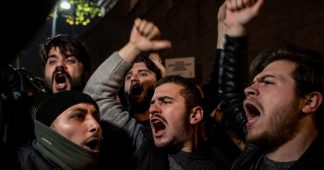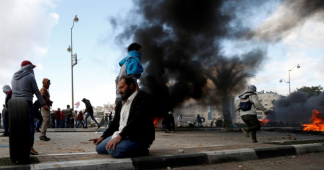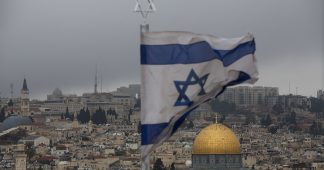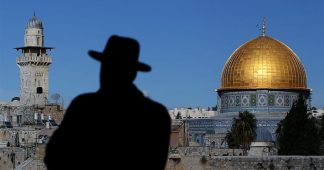Βυ Pissias Vangelis*
“ […] How lonely sits the city that was full of people! How like a widow has she become, she who was great among the nations! She who was a princess among the provinces has become a slave. […] Alas! The Lord has covered Daughter Zion (Jerusalem) with his anger. He has thrown down the splendor of Israel from heaven to earth; he did not protect his temple […] Her city gates have fallen to the ground; he smashed to bits the bars that lock her gates. Her king and princes were taken into exile; […]”
Prophet Jeremiah (Lamentations 1, 2)
Jerusalem, since its birth, flourished but was also destroyed many times. Its total destruction, by the Babylonians, is described in psalms of the Old Testament where the prophet Jeremiah (587 BC) laments it but also criticizes the arrogance of its Jews rulers and the joint responsibility of the then citizens, the Israelites as he mentions, for the resulting destruction (psalm 137). The humbles only among the population, exhausted during their 50 years exile[1] but not the privileged who didn’t came back, because in Babylon they managed to prosper, are mentioned by the psalm; Their anguish due to the uprooting is expressed by their own words:
“…if I forget you, Jerusalem, let my right hand wither! Let my tongue cling to the roof of my mouth…”
Jeremiah was taken against his will to Egypt by some of the Jews who feared reprisal from the Babylonians. Even in Egypt he continued to rebuke his fellow exiles. Jeremiah was stoned to death by his exasperated fellow countrymen in Egypt. (Encyclopedia Britannica). As it happened 22 years ago, when the only pragmatic and longsighted Israeli prime minister Yitzhak Rabin was killed, being considered as a negationist of the Zionist expansive project, by a fanatic of his same religion .
Irrational but real, both met the fate we Greeks reserved to our first Governor Ioannis Kapodistrias, right after the War of Independence (1831).
# # #
November 1947, almost 70 years ago, the 181 U.N. resolution legitimized the occupation of the bigger part of Palestine. The imposed territorial division founded an overprotected neophyte Israeli state and a small, weak, virtual Palestinian state. An exile of 760.000 Palestinians[2] followed; Nevertheless, although UN resolution aimed at a progressive disappearance of the deliberately non sustainable Palestinian state, concerning Jerusalem decided otherwise, defining a specific multiethnic, multireligious regime (corpus separatum). That distinction didn’t came up, obviously, as a result of moral considerations but: a) as an acknowledgment of the de facto multicultural composition of Jerusalem’s population, b) as a compensation towards Arab regimes, most of them under mandatory regime and, c) as a symbolic act of geopolitical end.
“If I forget you, Jerusalem” that is to say if I do not remember the most precious that I have, if I exchange it with anything else, then let me be punished…”
Fyodor Dostoyevsky (Karamazov brothers, chapter 7)
In the case of this outstanding work of worldwide literature, Jerusalem is Iliousha[3], the child that perceives his imminent death and calmly begs his father not to forget him and to visit his grave in the evenings. But, he also invites his father -unique moment in literature- to replace him after death by adopting another child. The words quoted above are the father’s answer…
Jerusalem, in the aforementioned work, is the unforgettable and irreplaceable value that nestles in the life of every true human being for whatever most precious he has in this life…
Dostoyevsky is followed, 60 years later, by the great American author William Faulkner who published (1939) his novel the novel “If I Forget Thee, Jerusalem”. Ten years later (1949) in his speech during the Nobel Prize in Literature awarding ceremony, he referred to the meaning and the message of his the work with the following words:
“[…] the young man or woman of today…must teach himself that the basest of all things is to be afraid; and, teaching himself that, forget it forever, leaving no room in his workshop for anything but the old verities and truths of the heart, the old universal truths lacking which any story is ephemeral and doomed… love and honor and pity and pride and compassion and sacrifice.”
# # #
But it is not only global literature but Greek literature as well which emphasizes the symbolism of Jerusalem.
According Henri Tonnet, scholar in depth of Modern Greek literature, most of Greek litterateurs who refer to the abovementioned psalm were refugees, violently uprooted from their birthplace.
Fotis Kontoglou, writer, author, hagiographer and theological thinker, born in the Greek city Aivali in Asia Minor in 1895, from which he was uprooted after the Catastrophe of the Asia Minor Hellenism in 1922, although considers himself deeply Greek, he surprises us by declaring, 100 years ago, that his homeland is Jerusalem…
With respect to his mournful introduction to his work “Ancient peoples of the East” he writes:
“[…] they wanted me to deny my mother […] But I will never deny you, Jerusalem! May I lose my sight if I forget you
[…] My soul lives together with you […] In a place that has just as much light that is needed for person living in a foreign country, that is where I think of you at night…”
Kontoglou’s love for Jerusalem is not independent of his thoughts about the East and the West. In his collection “Secret Flowers” he writes:
“… People of the west are mostly rationalists and that is why […] any of them that stand out and don’t believe in their senses, turn towards the East because there they find the source of the spring so that they can drink to quench their thirst for some mysteries that cannot be investigated by the brain…”
It is not only Fotis Kontoglou, it is also the poet Georgios Seferis, winner of the Nobel Prize in Literature (1963), who lived in Jerusalem for a period of time. Also the writer Stratis Tsirkas[4], the ethnographic satire author Ioannis Kondylakis, the surrealist writer Yiannis Skarimbas who writes about the “Jerusalem of yearnings” and others.
Those literateurs who anteriorly referred to the ecumenical and communitarian spirit of the city internalized its unique symbolism, so aptly reflected in the words “If I forget you, O Jerusalem, if I deny you…”
One is bound to wonder if the state of Israel realizes that in inciting rage in the wider Middle East -today through its senile friend, the current US President, as two decades ago through his sax-playing predecessor, the destroyer of Yugoslavia- it may actually be undermining its very existence and bringing Nemesis unto itself, ushering in a new chapter in future cycles of human exile?
As for those who now revel, like Israel’s present leadership and those who support, or keep silent or merely stammer some empty words of criticism against the policies of Messrs. Trump and Netaniahu, do they not see that historical time, slow as it may be, can also sometimes be compressed into a mere instant? Do they not know that history has its own unguarded moments?
[1] With the demise of the Babylonian state, and by decree of the Persian king Cyrus, the captive Judeans were set free to return to their homes. How relevant sometimes the irony of the history…
[2] More than half of the Palestinian population at that time.
[3] Dostoyevsky describes admiringly the 9 years old child.. «such a small existence, such a big anger..”
[4] S.Tsirkas shares the title of his trilogy “Drifting Cities” (1961/66) with G.Seferis, who first edited the poem “Stratis Thalassinos on the Dead Sea” referring to “Jerusalem drifting city, city of refugies” (1942/44)
* PISSIAS Vangelis, Professor,International Economics Technology Transfer, Political Activist











